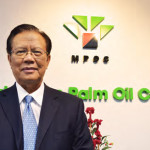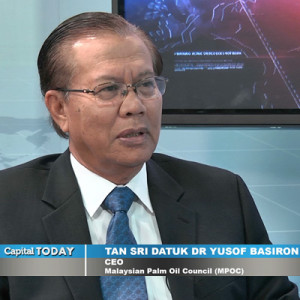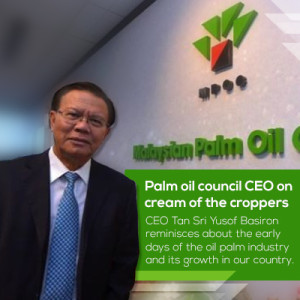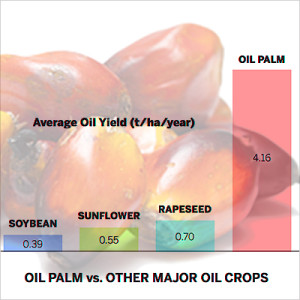Oil’s Well That Ends Well An Interview with the CEO of Malaysian Palm Oil Council
Tan Sri Datuk Dr Yusof Basiron is a modern man indeed. He is probably one of the few amongst his fellow CEOs who can claim to be running a regularly updated blog, along with being available on Facebook and Twitter. From the entries on his blog, it is clear that he has passion for his job and is ready to champion the cause of the Malaysian palm oil industry against anyone who may oppose it. Despite his busy schedule, he managed to squeeze in time for an interview with us to talk about his job, the palm oil industry and the importance of staying connected with the public.
The Globalist: What are the roles of MPOC and MPOB in the Palm Oil industry?
MPOB is the research body which focuses on producing biofuel from palm oil. The oil palm industry forms the economic backbone of Malaysia and the industry has faced a number of challenges in the face of globalization. Rapid responses are needed to meet the increasing challenges of the industry as they unfold. MPOB, as the custodian of the oil palm industry, is entrusted with meeting these challenges through excellence in R&D and services. I have been a part of MPOB throughout my entire career. In the last couple of years, MPOB has invested a lot of money into research and development through the entire value chain. Ecologically and economically sustainable development has been the guiding philosophy of the oil palm industry. MPOB has always played a facilitating role in this endeavor.
The mission of MPOC, meanwhile, is to promote the market expansion of the Malaysian palm oil and its products. They achieve this by enhancing the image of palm oil and creating better acceptance of palm oil through awareness of various technological and economic advantages and environmental stability. MPOC is shaped by a corporate identity that defines the organization as forward looking and insightful in its mission to promote the Malaysian palm oil industry.
The Globalist: What has been done to promote Malaysian palm oil in other industries?
Every year we travel to a number of countries and participate in a lot of meetings and seminars. The main aim of these seminars is to educate the people regarding palm oil and its uses. We have set up a number of regional offices to promote and monitor the palm oil market while also looking out for various prospects and opportunities within these countries. Whenever we identify an opportunity for increased trade, we alert our exporters to venture into those countries.
The Globalist: What are some of the big challenges that you face every day?
The Malaysian palm oil industry is very successful. Like any other industry, we focus a lot on product development, innovation and technology so that we produce improved and better products every year. With other countries entering the palm oil market now, I foresee that the competition in the near future is going to be intense. They are looking to produce with the same intensity and quality that we are producing. Our industry faces a threat from not only the palm oil producers but also edible oil producers. Indonesia is one of our closest competitors in the palm oil industry. Just like ours, Indonesia has a very favorable climate to grow oil palm trees. An advantage that Indonesia has over us is that there is more land and the cheap labor available to them and this will help them produce more palm oil every year. I however still believe and ascertain that we have the right attitude, strategy and plan to be the market leaders in the palm oil industry for years to come.
The Globalist: What are some of the major changes that the palm oil industry has gone through in the last couple of years?
The Malaysian palm oil industry has gone through the process of improving and reengineering itself. MPOB has developed a number of new ways of producing palm oil. Continued research and development is always the best method to bring about a revolution in the industry. The palm oil industry has progressed immensely. Today we are producing products of a wider variety and better quality for our customers. The key thing to note here is that we have successfully managed the supply and demand challenges faced by the industry.
The Globalist: How have the NGOs affected the palm oil industry? Do you foresee a peaceful collaboration between the two groups?
The NGOs have their own agenda. They want to stop developing countries from expanding their agricultural production. I believe that this is a very dangerous ideology to have because for countries like ours, the palm oil industry is a major contributor to the GDP of many countries. I disagree with the attitude that agricultural development should stop. To avoid such controversies, we have always focused on sustainable development and sustainable production. At the end of the day, the palm oil industry contributes significantly to the economic development of Malaysia, providing a range of benefits for both producers in the local economies and consumers in the global markets. Some of the key benefits of the industry are income and employment, infrastructure development and expansion of food and product supply.
The Globalist: Can you tell us a bit more about the future of palm oil as a biofuel?
The depletion of fossil fuels, coupled with the increasing awareness of environmental problems, has led to concerted and escalating R&D efforts in search of renewable and environment friendly alternative energy sources. The recent increase in demand for renewable fuels has resulted in tremendous increased production of biofuels worldwide. As a major producer of palm oil, Malaysia, through MPOB has carried out extensive R&D on the production of biodiesel from palm oil and its products since the 1980s.
MPOB has now become one of the successful technological providers for the production of biodiesel with the establishment of its first commercial plant in 2006. The homegrown palm biodiesel production technology is comparable to, if not better, than the technology found overseas. This is due to the in-depth understanding of the indigenous properties and characteristics of palm oil. The biodiesel produced meets the stringent quality requirements of the international biodiesel specifications, namely, ASTM D6751 and EN 14214. The use of sustainable palm oil for the production of palm biodiesel will make the Malaysian palm biodiesel industry even more sustainable.
The Globalist: Where does the future of palm oil lie, in its use as a biofuel or as a food product?
The acceptance of palm oil worldwide is due to its unique properties that encourage its use in a wide range of end products. These properties are made more versatile by the various fractions and refined forms that are available in the world market. At present, refined palm olein is the major form of product exported from Malaysia. Refined palm oil and refined palm stearin are also available and are suitable for various food-uses. The four main traditional uses of palm oil in food products are for cooking/ frying oil, shortenings, margarine and confectionary fats. Palm oil is popularly used in both solid fat products as well as in the liquid cooking oil sector especially in industrial frying applications. It offers several technical characteristics desirable in food applications, such as resistance to oxidation, which contributes towards longer shelf life of end products. Palm oil is ideally suited for use as an ingredient in shortenings and margarines as it has 20 – 22% solid fat content (SFC) at 20°C, which helps in the formulation of fat products with a plastic range. It tends to crystallize in small beta-prime crystals, a property desirable for some applications, in particular table and industrial margarines. Palm oil also has other functional attributes that make it a valuable ingredient in food formulations. In many applications, palm oil can be combined with harder fractions such as palm stearin to produce products of the required consistency without hydrogenation. Common products made from palm oil include frying and cooking oils, shortenings, vegetable ghee or vanaspati, margarines and spreads, confectionery and non-dairy products.
The Globalist: How essential is it for a CEO of a company to be technologically savvy and have an online presence by taking part in social media?
In today’s world it is very important for a CEO to have an online presence. The use of blogs and twitter is a very convenient way to pass around the ideologies of an entrepreneur. I also feel that it is easier for the palm oil industry to promote their products and discuss the benefits of the products through social media. It enables us to connect to the whole world. I believe blogs can be used as an open forum where every individual has the freedom to express their ideas and opinions. The comments of the public on blogs help us to understand them better and in turn we are able to provide better service to them. People also get to learn more about the palm oil industry in general.










Leave a Reply